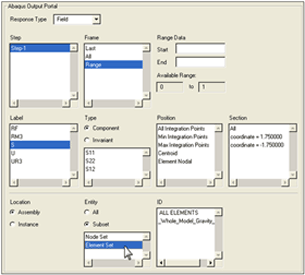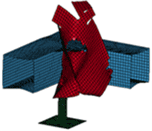Automated Numerical Search from Red Cedar Technology Speeds Design Optimization
Updated HEEDS Professional offers new LS-DYNA and Abaqus interfaces.
Latest News
June 24, 2009
By Anthony J. Lockwood
 Red Cedar Technology (East Lansing, MI) has announced the release of version 5.3 of HEEDS, its software for automating design optimization. HEEDS Professional 5.3 offers several new features that streamline the design optimization process, including direct interfaces to LS-DYNA, Abaqus, and Windows HPC Server 2008.
Red Cedar Technology (East Lansing, MI) has announced the release of version 5.3 of HEEDS, its software for automating design optimization. HEEDS Professional 5.3 offers several new features that streamline the design optimization process, including direct interfaces to LS-DYNA, Abaqus, and Windows HPC Server 2008.
HEEDS Professional captures and automates your current design workflow by leveraging your existing design and analysis tools. The software interfaces with most widely deployed CAE applications to automate the design optimization process, including automation of pre- and post-processing and complex simulations within a multidisciplinary optimization. In addition to its generic interface that facilitates using virtually any CAE tool within an optimization study, HEEDS offers direct interfaces for NX and Excel as well as Abaqus and LS-DYNA.
In version 5.3, the new HEEDS Professional LS-DYNA portal supports extraction of responses in all existing LS-DYNA output files, and the portal is compatible with versions 970 and 971 of LS-DYNA. The HEEDS Professional Abaqus Output Portal now supports Abaqus v6.9, making it compatible with Abaqus versions 6.6 through 6.9. It is also said to provide faster value extraction performance, and the portal has been updated to include all outputs available in the Abaqus odb file.
 The new interface to the Windows HPC cluster scheduler allows HEEDS to set up, execute, and monitor jobs on a Windows HPC cluster. Users can leverage this interface to perform one job or multiple jobs simultaneously, providing a speedup of the design study being performed. (The speedup factor is equal to the number of simultaneous evaluations that can be performed using the cluster.)
The new interface to the Windows HPC cluster scheduler allows HEEDS to set up, execute, and monitor jobs on a Windows HPC cluster. Users can leverage this interface to perform one job or multiple jobs simultaneously, providing a speedup of the design study being performed. (The speedup factor is equal to the number of simultaneous evaluations that can be performed using the cluster.)
One key to how HEEDS operates is its default search algorithm, SHERPA. SHERPA — an acronym meaning Simultaneous Hybrid Exploration that is Robust, Progressive and Adaptive — is a hybrid adaptive numerical search algorithm that combines strategies from several different search methods to quickly reach convergence with design criteria. SHERPA leverages these multiple search methods simultaneously, not sequentially, providing a further boost to execution performance. It continuously and automatically reduces a given method’s participation if the method is determined to be ineffective. As well, it modifies each search method’s tuning parameters as the search is in-progress.
Engineers leverage SHERPA through a tabbed layout that leads them through a six-step project setup and execution process. Since SHERPA operates automatically, expertise in optimization theory is not required. This process enables you to define a problem based on actual engineering data without being constrained by the capabilities of a given search method. Additionally, your problem definitions can be broader and include a larger number of variables.

While SHERPA is the default search algorithm used by HEEDS Professional, you can also choose from such algorithms as simulated annealing, response surface, multi-start local search, genetic algorithm, and quadratic programming. A modified version of SHERPA, Multi-objective SHERPA (MO-SHERPA) offers multiobjective Pareto search. Additionally, you can define your own search method through a user-defined method API. (See the link to white paper below for more on SHERPA.)
HEEDS Professional also offers features such as Design of Experiments (DOE) and Robustness and Reliability functionalities. Among these are full-factorial designs, fractional factorial designs, Taguchi orthogonal arrays, Plackett-Burman designs, Latin hypercube designs, central composite designs, D-optimal designs, Taguchi robust design arrays, structured sampling, and random (Monte Carlo) sampling.
For more information about HEEDS Professional, visit the Red Cedar Technology website.
Download the HEEDS Professional brochure.
Download a PDF white paper on SHERPA algorithm.
Details on how to request a free, 30-day evaluation copy of HEEDS Professional.
Visit the Red Cedar Technology library of white papers.
See why the DE Editors selected HEEDS Professional for their Pick of the Week.
Subscribe to our FREE magazine, FREE email newsletters or both!
Latest News
About the Author
Anthony J. Lockwood is Digital Engineering’s founding editor. He is now retired. Contact him via [email protected].
Follow DE





